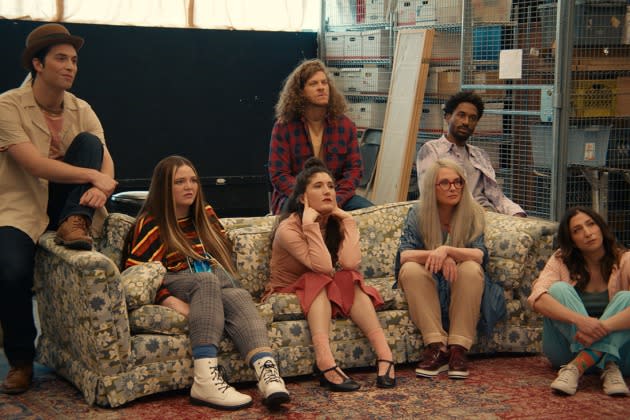‘First Time Female Director’ Review: Chelsea Peretti’s So-So Skewering of Theater and Gender Politics
- Oops!Something went wrong.Please try again later.

You can probably guess the premise of Chelsea Peretti’s occasionally amusing film First Time Female Director from its title. The comedy, written and directed by the Brooklyn Nine-Nine star, follows the misadventures of a local theater’s first woman director — how scandal thrusts her into the spotlight and a lack of institutional support tries to yank her out of it. In its roughly 29 seasons, productions at the fictional Regis Theater in Glendale have only ever been directed by men. Sam, an anxious playwright played by Peretti, is about to change that.
As with so many recent historical firsts, Sam’s appointment is propelled by a misbehaving man. When a shocking impropriety shakes the community theater, its artistic director Sheldon Clifford (Andy Richter) fires popular director Greggy Thompson (Tim Heidecker). Sam wasn’t Sheldon’s first, second or, if we’re being honest, even third choice, as evidenced by the film’s brisk and entertaining opener, but she is eager and, most importantly, available. Their conversation bears the awkwardness of these appointments; to be the first in any regard is a thrilling achievement and a guaranteed curse.
More from The Hollywood Reporter
Sam is tasked with putting on her own play, a chaotic narrative about a rural family based on Peretti’s own Rain’s Comin In skit. The Southern drama models itself after the works of Tennessee Williams and riffs on the kind of deep, authentic projects that claim to be at once singular and universal: Rain’s Comin In is a play for our time, but it is also set centuries ago; it will hold a mirror up to the nation and shed light on where we’re going. Anyone with a deep affection for the theater world will appreciate how much fun First Time Female Director has with these tropes.
Peretti organizes her film according to the production timeline of Sam’s play. Bold title cards announce the Table Read, Local Experts, Rehearsal, Tech Rehearsals — you get the picture. These discrete sections function as self-contained sketches, where Peretti performs the tricky act of balancing humor and keen cultural observation without devolving into an overly didactic tone. She’s largely successful, especially in the Table Read and Tech Rehearsal sections, where we witness just how ill-prepared Sam is for the job.
There’s a pattern — more apparent at the heights of the #MeToo and Black Lives Matter movements — wherein institutions replace their problematic white men with people from historically marginalized communities. The appointments are celebrated as progressive steps, but these new leaders are heirs to crumbling empires, saddled with the responsibility of resuscitating businesses with little support. Peretti cleverly highlights this tension through Sam’s chameleonic behavior. She’s a director in search of her own voice and vision, but the stakes of her experiments — trying on different leadership styles in hopes that one sticks — are much higher. Failure isn’t an option for symbols of progress.
The results of Sam’s attempts are clumsy and a bit of a mixed bag. She tries to lead like a lion — aggressive and scary — but that fits unnaturally. Taking the more honest route and admitting her own insecurities backfires, too. Still, she can’t give up because the threat of a mutiny led by actor Rudy (Benito Skinner) haunts her. Rudy, a sly, power-hungry figure, has the unequivocal support of the rest of the cast (portrayed by Kate Berlant, Blake Anderson, Megan Stalter and Jak Knight) and he wields it against an insecure Sam.
Their feud sustains itself until it doesn’t, and that could be the tagline for First Time Female Director as a whole. The film starts off on a strong note with a lot of easy laughs — most a result of Sam’s interactions with her awful therapist (Amy Poehler), a few from her struggles with the troupe of artists helping to run the show: the actors who intimidate Sam, the billionaires whose donations keep the theater running and the mercurial crew whose moods swing wildly from disdain to affection. The rest of the chuckles can be credited to the film’s mockumentary style, which adds to its overall gonzo mood.
The film begins to sag the deeper we get into Sam’s story, which requires more digging than Peretti can give us. The jokes are rarely the same, but they hit similar notes; the problems with the characters feel repetitive; and the movie circles the same ideas until plot points need to be tidied. Despite the laughs along the way, little new ground is broken when it comes to the film’s conclusions.
In fact, as a satire of white women’s social power in American society (their glass ceilings are lower than those of other marginalized peoples), the film risks becoming what it tries to mock: Peretti’s critiques of Sam’s misguided attempts to make her rural drama socially relevant after seeing a rival play by a Black woman land too unevenly to make sense. And in its final acts, First Time Female Director strays from its promise of caustic skewering and ends up, instead, a mildly acerbic lesson.
Best of The Hollywood Reporter
